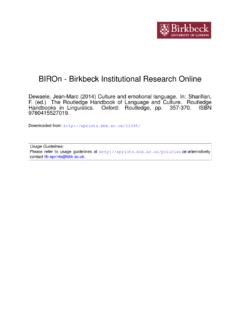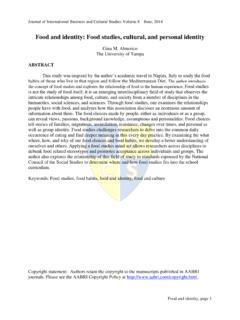Transcription of Culture, Emotion Regulation, and Adjustment
1 ATTITUDES AND SOCIAL COGNITIONC ulture, Emotion Regulation, and AdjustmentDavid MatsumotoSan Francisco State UniversitySeung Hee YooYale UniversitySanae NakagawaSan Francisco State University37 Members of the Multinational Study of CulturalDisplay RulesThis article reports differences across 23 countries on 2 processes of Emotion regulation reappraisal andsuppression. Cultural dimensions were correlated with country means on both and the relationshipbetween them. Cultures that emphasized the maintenance of social order that is, those that werelong-term oriented and valued embeddedness and hierarchy tended to have higher scores on suppres-sion, and reappraisal and suppression tended to be positively correlated.
2 In contrast, cultures thatminimized the maintenance of social order and valued individual Affective Autonomy and Egalitarianismtended to have lower scores on Suppression, and Reappraisal and Suppression tended to be negativelycorrelated. Moreover, country-level Emotion regulation was significantly correlated with country-levelindices of both positive and negative : culture , Emotion regulation, suppression, reappraisal, adjustmentThe 37 coauthors of this article, in alphabetical order by last name, areas follows: Jose Alexandre, Unicapital, Sa o Paulo, Sa o Paulo, Brazil;Jeanette Altarriba, Department of Psychology, University at Albany, StateUniversity of New York; Ana Maria Anguas-Wong, Department of Psy-chology, San Francisco State University.
3 Monica Arriola, Department ofPsychology, University of Fribourg, Fribourg, Switzerland; Lisa M. Bauer,Department of Psychology, Pepperdine University; Michael Harris Bond,Department of Psychology, Chinese University of Hong Kong, Shatin,China; Rosa Cabecinhas, Department of Psychology, University of Minho,Braga, Portugal; Jeeyoung Chae, Korea culture and Tourism Policy Insti-tute, Seoul, Korea; Anna Laura Comunian, Department of General Psy-chology, University of Padua, Padova, Italy; Dawn N. DeGere, Departmentof Psychology, University of Washington; Luciana de Melo Garcia Bley,Department of Psychology, San Francisco State University; Hung Kit Fok,Department of Psychology, Chinese University of Hong Kong, Shatin,China; Wolfgang Friedlmeier, Department of Psychology, Grand ValleyState University; Fabiano Melo Garcia, Open English School, Sa o Ber-nardo do Campo, Sa o Paulo, Brazil; Anjali Ghosh, Psychology ResearchUnit, Indian Statistical Institute, Calcutta, India; Juliana V.
4 Granskaya,Department of Psychology, St. Petersburg State University, St. Petersburg,Russia; Elvair Grossi, Fundacao de Santo Andre , Santo Andre , Sa o Paulo,Brazil; Renuka Joshi, Department of Psychology, (PG) College,Dehradun, India; Hisako Kakai, School of International Politics, Econom-ics and Business, Aoyama Gakuin University, Tokyo, Japan; EmikoKashima, School of Psychological Science, La Trobe University, Victoria,Australia; Waheeda Khan, Department of Psychology, Jamia Millia Is-lamia (Central University), New Delhi, India; Jenny Kurman, Departmentof Psychology, University of Haifa, Haifa, Israel; Shamsul H.
5 Mahmud,Department of Psychology, University of Dhaka, Dhaka, Bangladesh;Andrew Mogaji, Department of Psychology, University of Lagos, Lagos,Nigeria; Feggy Ostrosky-Solis, Department of Psychology, National Uni-versity Mexico, Mexico City, Mexico; Dona Papastylianou, Department ofSocial Administration, Democritus University of Thrace, Komotini,Greece; Saba Safdar, Department of Psychology, University of Guelph,Guelph, Ontario, Canada; Eri Shigemasu, Department of Law, YamanashiGakuin University, Yamanashi, Japan; Erika Spie , Department of Psy-chology, Ludwig-Maximilians-University Munich, Munich, Germany;Stanislaw Sterkowicz, Department of Combat Sports, Academy of PhysicalEducation, Krakow, Poland; Piotr Szarota, Department of Psychology,Warsaw School of Social Psychology, Warsaw, Poland; Berta Vishnivetz,Department of Psychology, The National School for Social Workers,Frederiskberg, Denmark; Neharika Vohra, Department of OrganizationalBehavior, Indian Institute of Management, Ahmedabad, India.
6 ColleenWard, School of Psychology, Victoria University of Wellington, Welling-ton, New Zealand; Sowan Wong, Department of Psychology, BrunelUniversity, Uxbridge, United Kingdom; Rongxian Wu, Department ofPsychology, Suzhou University, Suzhou, China; Alfred Zengeya, Depart-ment of Psychology, Bindura University of Science Education, Bindura, Matsumoto and Sanae Nakagawa, Department of Psychology,San Francisco State University; Seung Hee Yoo, Department of Psychol-ogy, Yale thank Sholeh I. Mireshghi for her assistance with the compilation ofthe Adjustment data and Marija Drezgic, Shannon Lee Pacaoan, DevonMcCabe, Aaron Estrada, and Janice Cheung for their assistance in thegeneral laboratory concerning this article should be addressed to DavidMatsumoto, Department of Psychology, San Francisco State University,1600 Holloway Avenue, San Francisco, CA 94132.
7 E-mail: of Personality and Social Psychology, 2008, Vol. 94, No. 6, 925 937 Copyright 2008 by the American Psychological Association 0022-3514/08/$ : regulation has become an important concept in person-ality and social psychology. It refers to the ability to manage andmodify one s emotional reactions in order to achieve goal-directedoutcomes. Gross (1998; Gross & John, 2003) identified two as-pects of Emotion regulation:Reappraisal the way in which in-dividuals construe an Emotion -eliciting situation to change itsimpact on emotional experience andSuppression the inhibitionof emotional expressive behavior.
8 Reappraisal refers to the regu-lation of emotional experience by changing the contents of one sthoughts after an Emotion has been elicited or by re-evaluating theemotion-eliciting stimuli; Suppression refers to regulating emo-tional expression by controlling or neutralizing emotional and ethnic-group differences on Emotion regulation(Gross & John, 2003), and a small but growing literature on itsinterpersonal effects (below), suggest that there are cultural dif-ferences on it as well. This article reviews the relevant literatureconcerning the interpersonal effects of Emotion regulation andconcerning culture and cultural values.
9 We then provide a theo-retical framework based on cultural values to explain culturalvariation in Emotion regulation and offer evidence for that Interpersonal Effects of Emotion RegulationA number of studies have demonstrated theintrapersonal effectsof Emotion regulation on affect and cognition related to healthyadaptation and Adjustment (Gross & Levenson, 1993, 1997; Rich-ards & Gross, 2000). A small but growing literature, however, hasbegun to demonstrate itsinterpersonal functions as well. Emotionregulation has been found, for instance, to be associated withsympathy and prosocial behaviors (Eisenberg, 2000) and withmorally relevant behavior and general social competence (Eisen-berg, Fabes, Guthrie, Murphy, & Maszk, 1996).
10 Suppression hasbeen associated with less social closeness and support andavoidant attachments, whereas Reappraisal has been associatedwith greater sharing of emotions , closer relationships, and greatersocial support (John & Gross, 2004). Butler et al. (2003) found thatSuppression disrupted communication, reduced rapport, and inhib-ited relationship formation among pairs of unacquainted womenwho discussed an unsettling ability to regulate Emotion , both by reappraising the natureof eliciting events and regulating expressive behavior, therefore, islearned within a developmental context, such as family situationsand relationships (Bell & Calkins, 2000; Miller, McDonough,Rosenblum, & Sameroff, 2002.)














